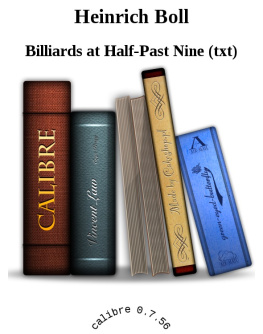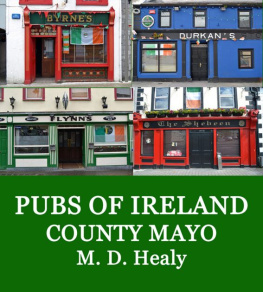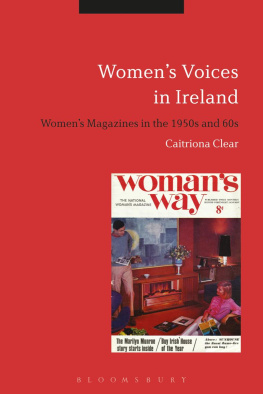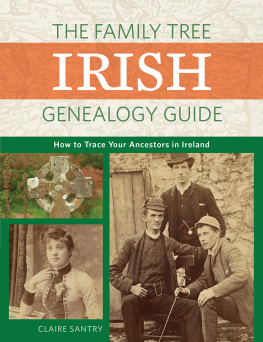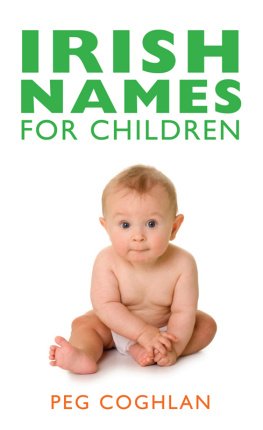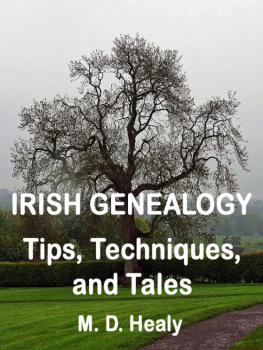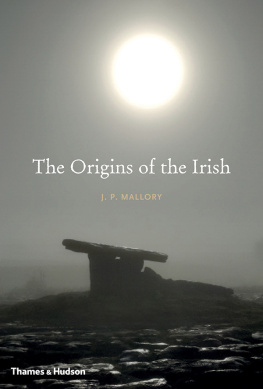Heinrich Boll - Irish Journal
Here you can read online Heinrich Boll - Irish Journal full text of the book (entire story) in english for free. Download pdf and epub, get meaning, cover and reviews about this ebook. year: 2011, publisher: Melville House, genre: Detective and thriller. Description of the work, (preface) as well as reviews are available. Best literature library LitArk.com created for fans of good reading and offers a wide selection of genres:
Romance novel
Science fiction
Adventure
Detective
Science
History
Home and family
Prose
Art
Politics
Computer
Non-fiction
Religion
Business
Children
Humor
Choose a favorite category and find really read worthwhile books. Enjoy immersion in the world of imagination, feel the emotions of the characters or learn something new for yourself, make an fascinating discovery.

- Book:Irish Journal
- Author:
- Publisher:Melville House
- Genre:
- Year:2011
- Rating:5 / 5
- Favourites:Add to favourites
- Your mark:
- 100
- 1
- 2
- 3
- 4
- 5
Irish Journal: summary, description and annotation
We offer to read an annotation, description, summary or preface (depends on what the author of the book "Irish Journal" wrote himself). If you haven't found the necessary information about the book — write in the comments, we will try to find it.
Irish Journal — read online for free the complete book (whole text) full work
Below is the text of the book, divided by pages. System saving the place of the last page read, allows you to conveniently read the book "Irish Journal" online for free, without having to search again every time where you left off. Put a bookmark, and you can go to the page where you finished reading at any time.
Font size:
Interval:
Bookmark:
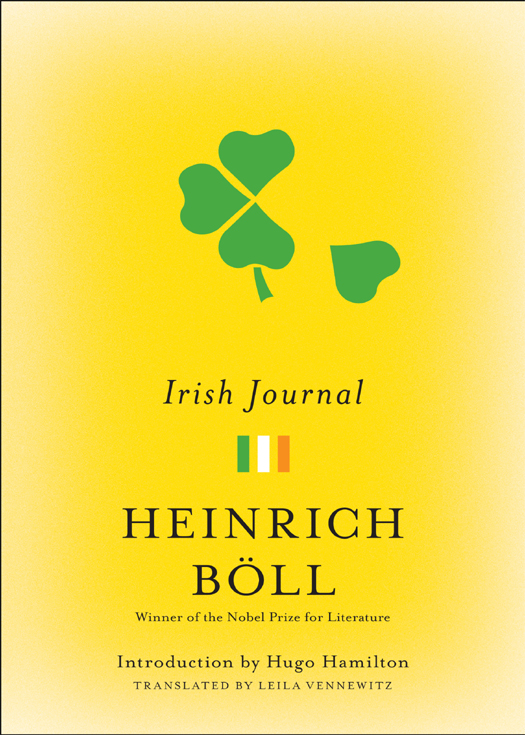
HEINRICH BLL
In 1972, Heinrich Bll became the first German to win the Nobel Prize for literature since Thomas Mann in 1929. Born in Cologne, in 1917, Bll was reared in a liberal Catholic, pacifist family. Drafted into the Wehrmacht, he served on the Russian and French fronts and was wounded four times before he found himself in an American prison camp. After the war he enrolled at the University of Cologne, but dropped out to write about his shattering experiences as a soldier. His first novel, The Train Was on Time, was published in 1949, and he went on to become one of the most prolific and important of post-war German writers. His best-known novels include Billiards at Half-Past Nine (1959), The Clown (1963), Group Portrait with Lady (1971), and The Safety Net (1979). In 1981 he published a memoir, Whats to Become of the Boy? or: Something to Do with Books. Bll served for several years as the president of International P.E.N. and was a leading defender of the intellectual freedom of writers throughout the world. He died in June 1985.
Hugo Hamilton is a novelist and the author of the bestselling German-Irish memoir, The Speckled People, about Hamiltons childhood in Dublin with a German mother and a fervent Irish nationalist father who prohibited the use of English in the house. He is also the author of Die Redselige Insel, a travel book in the steps of the Heinrich Blls Irish Journal, which was published in German by Luchterhand fifty years after the original. He lives in Dublin.
The Essential
HEINRICH BLL
The Clown
The Safety Net
Billiards at Half-Past Nine
The Train Was on Time
Irish Journal
Group Portrait with Lady
Whats to Become of the Boy? Or:
Something to Do with BooksA Memoir
The Collected Stories of Heinrich Bll
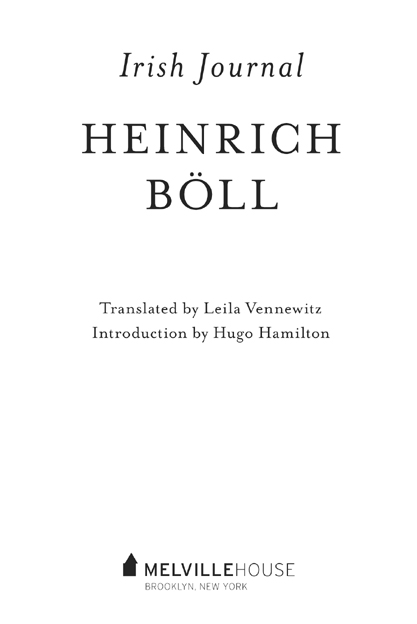
Translators Acknowledgment
I am deeply grateful to my husband, William Vennewitz,
for his assistance in this translation.
Leila Vennewitz
Vancouver, Canada
Irish Journal
Originally published in German as Irisches Tagebuch by Heinrich Bll
1957, 1988, 2005 by Verlag Kiepenheuer & Witsch GmbH & Co. KG,
Cologne, Germany
Translated by Leila Vennewitz
Introduction 2011 Hugo Hamilton
Melville House Publishing
145 Plymouth Street
Brooklyn, NY 11201
www.mhpbooks.com
The Library of Congress has cataloged the paperback edition as follows:
Bll, Heinrich, 1917-1985.
[Irisches Tagebuch. English]
Irish journal / Heinrich Bll; translated from the German by Leila
Vennewitz.
p. cm.
Originally published in German as Irisches Tagebuch by Heinrich Boll,
c1957, 1988, 2005 by Verlag Kiepenheuer & Witsch GmbH & Co. KG,
Cologne, Germany.
eISBN: 978-1-935554-83-7
1. IrelandDescription and travel. 2. Bll, Heinrich, 1917-1985Travel
Ireland. I. Title.
DA978.B5613 2011
914.1504823dc22
2011000600
v3.1
_______________
INTRODUCTION
by Hugo Hamilton
When Heinrich Bll first arrived in Ireland in the 1950s, the country was still asleep. He describes the journey by night across the Irish sea on the mail boatthe Catholic priest with the safety pins, the returning emigrant, the infinite cups of tea and the huddle of whispered conversations. He sets foot at dawn in a place where time is not a measurable substance. Where clocks and language itself are not instruments of exact truth, but of social guesswork. It is a place far from the center, where poverty and wealth are still in the hands of God, where the people have not yet woken up from that deep spell of religious faith.
It is into this timeless landscape that the German writer arrives, as Joyce would put it, trying to wake up from the nightmare of history in Europe. Ireland has been untouched by the Second World War. It has also remained untouched by the post-war rush for material certainty. It is a place where the children are natural, where the people survive on their humor and reduce their misfortune by saying that things could be worse.
Ireland is a sanctuary. An exceptional place which has stalled at an exceptional moment in time, just before it leaped over a century and a half and caught up with another five into modernism. He finds refuge here on the outer rim of Europe and sends home a beautiful literary postcard to his people.
I can still remember this small travel book first arriving by post in our house in Dublin. It was in German, sent by my aunt in Salzburg. For my German mother, it was a verification of her own move across to Ireland. Like Heinrich Bll, she came from the Rhineland, and reading his collection of short, evocative sketches was more like leafing back through her own first impressions. He was speaking out of her mouth, as they say in Germany.
When I got the book to read as a boy, it turned me into a visitor in my own country. I had grown up in Ireland, but there was a familiar tone in the writers observations which confirmed to me that I was also a newcomer, from somewhere else. My view of the country and its people was out of register by a few degrees to the east along the map of Europe where it got dark an hour or two earlier than it did in Ireland.
In effect, I had already inherited this book. I had grown up with the writers sense of surprise and incomprehension. I understood his innocence, his limited knowledge, his wide-angle enthusiasm, deep with affection at first sight. Perhaps I had also inherited the visitors simplistic awareness of what is strange.
Heinrich Bll is the classic traveler, comparing and counting the differences. He wanders around the city of Dublin and hears the people repeatedly saying sorry, like an habitual Irish greeting. The banks are not open yet and he cannot change money, but he still manages to get to Westport by train, on trust. The railway staff even phone ahead to let everyone know of the passenger traveling on credit.
He makes his way out to Achill Island and finds a savage beauty in the landscapesilence, weather, anger in the sea, people now and again, and distances which are painful on the eyes.
beauty hurts because on sunny days you can see for twenty, thirty miles without human habitation: only azure islands that are not real
There is a disclaimer at the beginning of Irish Journal which I sometimes feel like hanging around my own neck. This Ireland exists: but whoever goes there and fails to find it has no claim on the author.
The invocation to the reader is not to take everything literally. He makes no claim for authenticity. He is telling us only what he sees with his own eyes. Like a modernist painter, Jack B. Yeats, or Matisse, he trusts us to believe the extravagant flight of colors without expecting to find them again in real life. He is aware how quickly the light can change its mind in Ireland.
Of course the people are still saying sorry all the time. Of course they still live on their humor and their imagination. But he doesnt want us to go knocking on the door of the doctors house in Achill Island to see if the doctors wife really has a lacquered fingernail that looks like a shiny car tracing her husbands winding journey along the map. Or to ask whether the patient the doctor has gone to call on really has the most beautiful feet in the world. Or where the copper kettle is which he brought back with him as payment on that stormy night.
Font size:
Interval:
Bookmark:
Similar books «Irish Journal»
Look at similar books to Irish Journal. We have selected literature similar in name and meaning in the hope of providing readers with more options to find new, interesting, not yet read works.
Discussion, reviews of the book Irish Journal and just readers' own opinions. Leave your comments, write what you think about the work, its meaning or the main characters. Specify what exactly you liked and what you didn't like, and why you think so.

